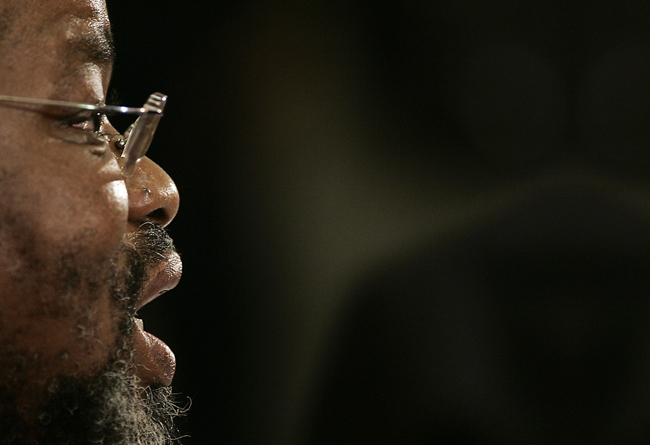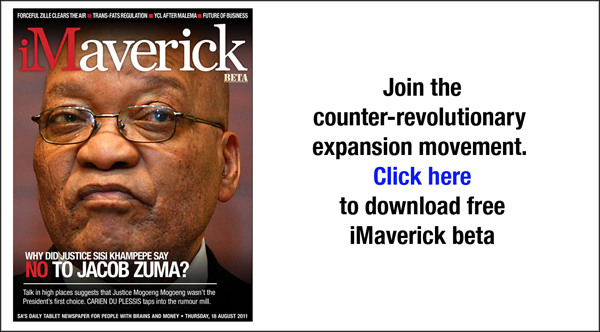Politics
Gwede Mantashe and the Deathly Bills

ANC secretary general Gwede Mantashe warned the Constitutional Court against acting “in opposition to government” in an interview with Sowetan on Thursday. PAUL BERKOWITZ examines some of the Bills recently drafted by Parliament and finds out that the problem lies with the legislature, and not with the judiciary.
Comments made by ANC secretary general Gwede Mantashe in an interview with Sowetan have raised serious concerns. Mantashe said the judiciary might act “to arrest the functioning of government”, that the Constitutional Court could act “emotionally” if it rules against a Parliamentary Act, and even goes so far to suggest that some Constitutional Court judges were motivated by personal ambition in their ruling on the extension of Judge Ncgobo’s term.
These comments, if quoted correctly, are indeed worrying. Mantashe seems to suggest, more than once in the interview, that the work of the legislature is the most important work of government and that the judiciary is playing an obstructionist role when it passes judgment against it. Ominously, he concludes the interview by warning the judiciary not to undermine “a democratically elected Parliament”. He appears to believe that, by checking the power of the legislature, as required by the Constitution and by democratic tradition, the courts are somehow threatening democracy.
Mantashe’s frustration with the judiciary is clear in the interview. And it is understandable. It has become a lot harder for the ANC to push contentious legislation through Parliament, for a couple of reasons. The first, and most important by far, is the loss of its two-thirds majority in Parliament. Following the 2004 national elections, the ANC had 279 of the 400 national assembly seats. In 2009 the party fell below the 267-seat mark to 264. It also doesn’t have too many clear-cut allies in the smaller parties on which it can count to vote with it to get a two-thirds majority. The two-thirds majority is the minimum vote needed to amend the Constitution (and a three-quarter majority is needed to amend the Bill of Rights).
That’s assuming the ANC can count on all of its members to vote en bloc anyway. Tensions within the tripartite alliance are high and Cosatu in particular does not see eye-to-eye with the ANC on a couple of Bills before the assembly. In my experience of interacting with some of the new parliamentarians, they appear to be more independent-minded and less in awe of the centre of power than some of their predecessors. Whether this translates into independence in their voting is, admittedly, another matter.
If a particular Bill centres around so-called “mom-and-apple-pie issues” on which all parties agree, there’s no fear of objection and it’s likely to be passed without any fuss. If, however, a Bill is so controversial it would amend or require an amendment to the Constitution, it would need 267 votes, or even 300 in some cases, in Parliament. If it did not receive these votes, it could ultimately be declared null and void by the Constitutional Court.
At the moment, a number of really controversial Bills are being debated in Parliament or have been before Parliament in the recent past. There’s the Protection of Information Bill, which former minister of intelligence Ronnie Kasrils has described as “a dog’s breakfast of toxic gruel”. Before that there were the Seventeenth and Eighteenth Constitutional Amendment Bills. The former attempted to solve the problems caused by the regional electricity by potentially taking powers from local and provincial government and placing them in the hands of national government. The latter was so loosely worded some commentators feared it could end up granting Parliament immunity from the judiciary, and would require 75% of the vote to be passed into law. Both of these Bills appear to have been withdrawn for the time being.
Mantashe, however, reflects the mood of a ruling party that is feeling constricted and limited by the democratic process. That’s typical for dominant majority parties throughout the world. It’s also true that the threat of the judiciary may be a strategic move by the DA (and other parties) that don’t have the same numbers in Parliament the ANC has. That’s not to condone or condemn any of the actors in this play, just to confirm that their actions are rational and expected within the political power struggle. Mantashe and the ANC could do a better job of promoting respect for Parliament, however, by increasing the quality of its products and processes. That means drafting laws more carefully and thereby ensuring they won’t be sent back for revision. Otto von Bismarck suggested that law-making is like sausage-making. Rather than blame the customer for complaining about the dish and sending it back to the kitchen, it would be better for the maitre d’ to make sure the chefs knows what they’re doing. DM

Read more:
- ‘Constitutional Eighteenth Amendment Bill: Parliamentary Submission’ , Constitutionally Speaking blog (Pierre de Vos)
- ‘Judges moving into politics’: an interview with Gwede Mantashe, Sowetan.
Photo: Reuters.




 Become an Insider
Become an Insider